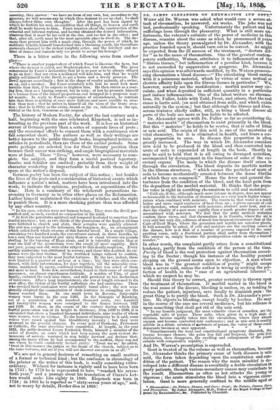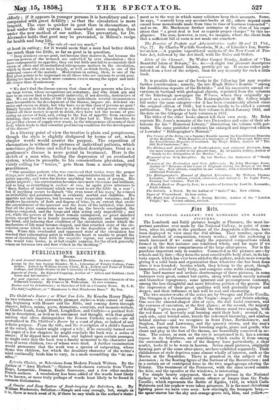DE. TAME'• ALEXANDER OM RREEMATTSM AND GOT T.* WREN old
Dr. Warren was asked what would cure a severe at.. tack of rheumatism, he answered, six weeks. The joke was not bad, professionally speaking. Unfortunately the patient and his sufferings loom through the pleasantry. What is still more un- fortunate, the veteran's estimate of the power of medicine in this disease, remains about the same as when he pronounced it years ago, unless the theory promulgated by Dr. Alexander, with the practice founded upon it, should turn out to be correct. As migght be expected from the ill success of the treatment, " doctors dif fer " as to the cause of rheumatism. One of the greatest contem- porary authorities, Watson, attributes it to inflammation of the " fibrous tissues," but inflammation of a peculiar kind, because it is not succeeded by suppuration or gangrene. Dr. Alexander says this opinion was afterwards modified, by Dr. Watson pronoun- cing rheumatism a blood disease—" The circulating blood carries with it a poisonous material, which by virtue of some mutual or electric affinity falls upon the fibrous tissues in particular." We, however; scarcely see the modification ; morbid matter may cir- culate, and when deposited in sufficient quantity in a particular part induce inflammation. One of the latest writers on rheuma- tism, Dr. Fuller, holds with Todd, Front, and others, that the real cause is lactic acid, (an acid obtained from milk, and which exists naturally in the system,) but that although the fibrous and fibro- serous textures chiefly suffer, still, as being a blood disease all parts of the body are more or less liable to be affected.
Dr. Alexander agrees with Dr. Fuller so far as considering the " materies morbi" of rheumatism to exist primarily in the blood. But this " materies" he holds to be urates, that is salts of lithie or uric acid. The origin of this acid is one of the mysteries of vital chemistry, but it is eliminated in health, and bears a cer- tain proportion to urea. In disease this proportion is often greatly increased. The way in which Dr. Alexander considers uric acid to be produced in the blood and then converted into urate of soda is expounded at length in the book. Shortly he may be said to hold that it is all owing to deranged nutrition, accompanied by derangement in the functions of some of the ex- cretory organs. The mode in which the disease itself arises is through the circulation. The blood deposits its morbific matter In the fibrous structures, " which causes the particles of urate of soda to become mechanically arrested between the dense fi.brilhe of which they are composed." Hence the fever and general dis- turbance from the condition of the blood, and the local pain from the deposition of the morbid material. He thinks that the popu- lar voice is right in ascribing rheumatism to cold and moisture.
"Cold air, if dry, although much more intense in degree, does not appear so favourable to the induction of rheumatism as a very much higher tempe- rature when combined with moisture. The reason is, that water is a much better and more rapid conductor of heat than air ; a given amount of cold will therefore, when combined with moisture, abstract more heat, and re- duce the vitality of a part more rapidly than a much greater degree of cold uneombined with moisture. We find that the army medical statistics confirm these views, and that rheumatism is in Canada, where the air is very cold but very dry, adisease of much leas frequent occurrence that at the Cape of Good Hope, where the geranium and myrtle are out-door plants. It will naturally be asked, if cold and moisture are the exciting causes of the disease, how is it that of a number of persons exposed to the same exciting cause, only a fractional portion shall suffer from rheumatism ? The answer is, simply because the predisposition exists in only a limited number."
In other words, the complaint partly arises from a constitutional tendency, partly from the condition of the person at the time Purity of blood is the real protection against rheumatism accord- ing to the Doctor ; though his instance of the healthy peasant sleeping on the ground seems open to objection. A man whose blood was in " the greatest condition of purity" might escape with a severe cold, unless the author is wrong in seeking the per- fection of health in the " case of an agricultural labourer "; which we suspect he may be.
Should this theory be correct, greater certainty is thrown upon the treatment of rheumatism. If morbid matter in the blood is the real cause of the disease, bleeding is useless, or, as tending to reduce the patient, injurious, save locally to diminish pain : the great thing is to purify the blood. Such is Dr. Alexander's prac- tice. He objects to bleeding, except locally by leeches. He may in the course of the case use several medicines, but his reliance is upon something that shall get rid of the uric acid. " In my humble judgment, the most valuable class of remedies, are the vegetable salts of potass. These salts, when given in a_ high state of dilution, become rapidly taken into the circulation, where they absorb oxygen and become converted into carbonates ; and as uric acid is readily soluble in a dilute solution of carbonate of gotass, the value of these renal, depurants becomes at once apparent.
" Simultaneously the local and constitutional symptoms diminish, the tongue becomes cleaner, the pulse less full and frequent, the pal'? first diminishes, then disappears, the swelling and enlargement of the joints subside with comparative rapidity ;"
And Dr. Warren's prescription is superseded. Gout is treated of in the volume as well as rheumatism, because Dr. Alexander thinks the primary cause of both diseases is uric acid, the form taken depending upon the constitution and con- dition of the patient. The reason why the main minhief is de- veloped into' a different disease is essentially a feeble circulation= gouty patients, though various secondary causes may contribute to the result. Rheumatism as often as not attacks the young or vigorous ; the urate stimulates the blood into a vigorous circu- lation. Gout is more generally confined to the middle aged or
• Rheumatism ; its Nature, Causes, and Cure : Gout; its Nature, Comes, Cute, and Prevention. DT James Alexander, M.D., Fellow of the Royal College of Sur- pope (by Examiaation),Jai. Published by Churchill. elderly ; if it appears in younger persons it is hereditary and ac- companied with great debility ; so that the circulation is more languid. The cure is quicker in gout than in rheumatism, at least under the old' system ; but somewhat more complex than under the new method of our author. The prevention, for Dr. Alexander holds that gout may be prevented, is Milton's recipe for health and long life, " The rule of—not too much,"
at least in eating ; for it would seem that a man had better drink too much than too little, so far as gout is in question.
" Deep drinkers escape gout, not because they deserve it, but because the nervous powers of the stomach are enfeebled by over stimulation ; they have consequently no appetite they cat but little and fail to accumulate that excess of elibte and ill-assimilated nitrogenous matters in the circulation, which in those who eat more largely, as well as drink freely, is one of the principal causes of the malady. Moderation in eating, then, is one of the first great points to be impressed on all those who are anxious to avoid gout. Eating too much is a much more common excess among the upper and mid- dle classes than drunkenness.
" We don't find the disease among that close of poor persons who live in our large towns, whose occupations are sedentary, and who drink gin and beer to an excess that is frequently indirectly, if not directly, destructive of life. We see in the habits of life of these individuals several circumstances most favourable to the development of the disease, impure air, deficient ex- ercise and excess in drink, but why have we in this class of persons no gout ? Simply because in their diet there is a deficiency of nitrogenous elements. Almost all their money is spent in drink, they have not the means of pro- curing an excess of food, and, owing to the loss of appetite from excessive drinking, they would be unable to eat it if they had it. They therefore do not get that excess of supply ever waste, in the nitrogenous elements of their food, which leads to that essential preixisting condition for the development of the disease."
In a literary point of view the treatise is plain and perspicuous, though the style is slightly disfigured by terms of art, when simpler words would answer the purpose. The exposition of rheumatism is without -the pictures of individual patients, which sometimes give force and relief to medical descriptions. Gout as a gentleman's disease is more genial in treatment. Here is the sketch of a man who, feeling the depression of an overloaded system, wishes to prescribe to his conscientious physician, and vainly calling for " tonics," gets them from a more complying practitioner. Our quondam patient, who was convinced that tonics were the proper things, now rallies, as it were, for a time, congratulates himself on his su- perior sagacity, and votes his doctor anything but a man of genius. His spirits improve ; his conversation becomes once more vivacious and brilliant, and so long as everything is couleur de rose, he again gives utterance to those. flashes of merriment which were wont to set the table in a roar ' ; but if anything occurs to disturb the even tenor of his ways,' he evinces an irritability and petulance that is evidently morbid and childlike. His appetite not only improves, but becomes very .frequently voracious, and he swallows hecatombs of flesh and flagons of wine, to an extent that excite the astonishment of the ignorant and the fears of the initiated, who know that all the great emunctories are locked up, the bowels constipated, the kidneys congested, and the lungs and skin acting only imperfectly ; and yet, while the powers of the heart remain unimpaired, no great mischief occurs, except that he is hourly increasing the quantity and impurity of the blood, and inducing that condition of the circulation under which the mechanism of life must become clogged, and that retarded state of the cir- culation ensue which is most favourable to the deposition of the urate of soda. When this overloaded and oppressed state of the circulation has reached that culminating point in which the heart is unable to propel the mass of circulating fluid with the requisite vigour, our sagacious friend who would take tonics, is at last caught napping, for the attack generally comes on between two and four o'clock in the morning."































 Previous page
Previous page